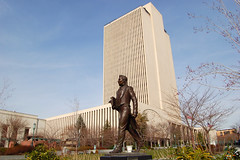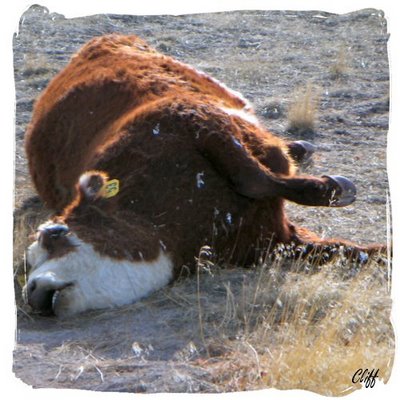"Referring to a wave of demonstrations in recent weeks, Rep. Virgil Goode of Virginia said, 'I say if you are here illegally and want to fly the Mexican flag, go to Mexico and wave the American flag.'"
Thursday, March 30, 2006
Sure 'nuff. Illegals Brandishing Mexican Flags Are A PR Problem
I knew the Mexican flag waving would be a problem. Sure enough. Here it is right from CNN...
Civil Disobedience and Mormons
 What to do with illegal immigrants is another great debate that divides Americans and the Republican party itself. The Economist reports ($$) this snippet that got me thinking about how a typical LDS member's response would be quite different.
What to do with illegal immigrants is another great debate that divides Americans and the Republican party itself. The Economist reports ($$) this snippet that got me thinking about how a typical LDS member's response would be quite different."The Roman Catholic cardinal of Los Angeles said that he would urge his priests and lay Catholics to ignore a ban on aiding illegal immigrants."Wow! That's foreign to the modern LDS way of looking at things. We don't ignore laws or commit acts of civil disobedience against laws we don't like, whatever they might be. We are people that have been trained in our youth to use the system. In short, we aren't revolutionaries.
LDS Articles of Faith12. We believe in being subject to kings, presidents, rulers, and magistrates, in obeying, honoring, and sustaining the law.And yes. I know that Thomas Jefferson thought a revolution was good every 20 years or so, but that isn't us. We will defend our lives if we have to. But at our core, we are organizational men who work within the system, even when a system might have flaws.
And when the system is deaf to our needs -- inflicting or allowing persecution, unjust incarceration or murder by mobs. Civil Disobedience? Revolution? Nope. Not us. History has shown that even in such a dire scenario our LDS propensity is to simply leave and be left alone.

Wednesday, March 29, 2006
My How The Church Has Grown
 This great big building is the mini church office building in front of the humongous church skyscraper in the back. I believe the church outgrew the mini building in front, built at the beginning of the twentieth century. It's now the office of the First Presidency.
This great big building is the mini church office building in front of the humongous church skyscraper in the back. I believe the church outgrew the mini building in front, built at the beginning of the twentieth century. It's now the office of the First Presidency.The building's grey granite with Greek columns makes it look like a few federal buildings of neo-classic design that I've seen back in Washington D.C.
No?

Tuesday, March 28, 2006
Manti Temple
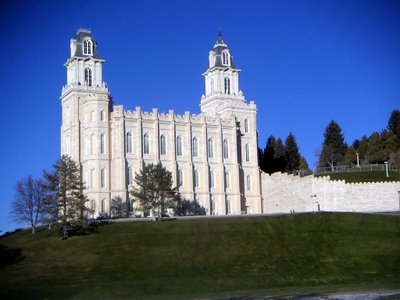
 It's hard to believe but it was just barely over twenty years ago that my wife and I were married in the Manti Temple. March 25, 1985.
It's hard to believe but it was just barely over twenty years ago that my wife and I were married in the Manti Temple. March 25, 1985.After the marriage ceremony, there was a moment in which the officiator gave advice to my wife and me. And what was that special advice given to build our marriage for time and all eternity?
Never go to bed mad at each other. Talk it over.
Time flies.
Monday, March 27, 2006
Wrong Flag, Wrong Country
 Utah understands illegal immigration. After all, our Utah pioneers were illegal immigrants of Mexico in Alta California, escaping religious persecution from the United States.
Utah understands illegal immigration. After all, our Utah pioneers were illegal immigrants of Mexico in Alta California, escaping religious persecution from the United States.Nowadays, Utah's 300,000 Hispanics are our fastest growing minority group.
But these photos of so many protestors in Los Angeles, Chicago and other American cities yielding Mexican flags will change the face of the debate. Our melting pot is much more welcoming of immigrants waving the American flag of freedom. Waving the Mexican flag in large American cities is no way to melt into America. Protestors should have carried American flags to show that they are an important part of America's economy.
Bad PR move.
My prediction. The country is going to have a stronger gut reaction on the side of immigration enforcement.
LDS Church Office Building
I went to Temple Square in downtown Salt Lake City, and took a few photos of the church office building. And what should my wandering eyes spot but a statue of Joseph Smith on one corner and Brigham Young on the other.
How appropriate. Here is the legacy of what Joseph Smith started.
How appropriate. Here is the legacy of what Joseph Smith started.
Doctrine & Covenants 20:1. The rise of the Church of Christ in these last days, being one thousand eight hundred and thirty years since the coming of our Lord and Savior Jesus Christ in the flesh, it being regularly organized and established agreeable to the laws of our country, by the will and commandments of God, in the fourth month, and on the sixth day of the month which is called April—2 Which commandments were given to Joseph Smith, Jun., who was called of God, and ordained an apostle of Jesus Christ, to be the first elder of this church;
Thursday, March 23, 2006
Downtown Salt Lake City
 I took this photo of downtown Salt Lake City from my neighborhood while walking my dog just before sunset.
I took this photo of downtown Salt Lake City from my neighborhood while walking my dog just before sunset.Those are the Oquirh Mountains on the west side of Salt Lake City running to the north. And you can see the Great Salt Lake between the two, looking north west.
My dog liked the view too. She would stop, sit and observe for several minutes at a time. Sometimes she's so human.
Wednesday, March 22, 2006
Good Leadership Is Being A Good Flip-Flopper
A reader recently commented that it is the mark of an intelligent person to change their mind if they receive information that convinces them otherwise. I've always found it strange that some of my buddies have a sense of great leadership as firmness in the right, and flip-flopping as a sign of bad leadership. How did that become their mantra? That's poor leadership.
God blesses the flip-floppers who do better their second try. Our scriptures are filled with world-class flip-flopping heroes. The Lord's most noble leaders flip-flopped in behavior, given new knowledge.
Abraham was commanded to kill his son, and then on the mount received new revelation not to. Jacob fled from confrontation and danger his whole life until he decided to confront it, wrestling with God first.
What they didn't flip-flop on was being true to the voice within, as God gave them to know. You know, line upon line of truth; here a little, there a little. We receive truth in little squirts and at our own imperfect level. What we think is true one day may be incomplete.
The Kingdom of God is built of flip-floppers. If you doubt this, go read about the power of Alma in the Book of Mormon flip-flopping in his life.
I greatly admire Reagan even more for owning up to the Iran-Contra Affair, then changing his cabinet and course.
Becoming celestial is about constantly learning amidst change. Maybe that is why change is built into the process.
Think about this. Our eternal spirits have always been and will always be; however, being a spirit is fine for a time, then it isn't enough. We have to add on a body. We grow from dependent infant, to independence, back to a more dependent old ager. We lose our body and turn back to our spirit form, only to take it back later in its perfect ressurected form.
LDS Lesson Learned in an LSD World:
One thing we know is that in this life and the next, God expects change from every one of us.
God blesses the flip-floppers who do better their second try. Our scriptures are filled with world-class flip-flopping heroes. The Lord's most noble leaders flip-flopped in behavior, given new knowledge.
Abraham was commanded to kill his son, and then on the mount received new revelation not to. Jacob fled from confrontation and danger his whole life until he decided to confront it, wrestling with God first.
What they didn't flip-flop on was being true to the voice within, as God gave them to know. You know, line upon line of truth; here a little, there a little. We receive truth in little squirts and at our own imperfect level. What we think is true one day may be incomplete.
I cannot imagine a scenario in which change is more difficult than to tell leaders of a religious group that they need to jump ship. And what mercy and understanding was shown to such leaders who devoted their whole lives to God but were stubborn in not adjusting their beliefs to new knowledge? “Truly I tell you,” Jesus said, “tax collectors and prostitutes are going into the kingdom of God ahead of you.”Isaiah 28: 10 For precept must be upon precept, precept upon precept; line upon line, line upon line; here a little, and there a little: 11 For with stammering lips and another tongue will he speak to this people.
The Kingdom of God is built of flip-floppers. If you doubt this, go read about the power of Alma in the Book of Mormon flip-flopping in his life.
I greatly admire Reagan even more for owning up to the Iran-Contra Affair, then changing his cabinet and course.
Becoming celestial is about constantly learning amidst change. Maybe that is why change is built into the process.
Think about this. Our eternal spirits have always been and will always be; however, being a spirit is fine for a time, then it isn't enough. We have to add on a body. We grow from dependent infant, to independence, back to a more dependent old ager. We lose our body and turn back to our spirit form, only to take it back later in its perfect ressurected form.
LDS Lesson Learned in an LSD World:
One thing we know is that in this life and the next, God expects change from every one of us.
Sunday, March 19, 2006
Grey Winter Day in Spring
 It was another snowy day in Spring today with low hanging snow clouds hiding the tops of the skyscrapers downtown.
It was another snowy day in Spring today with low hanging snow clouds hiding the tops of the skyscrapers downtown.Poor old Angel Moroni on his perch atop the Salt Lake Temple had his head in the clouds this afternoon as I drove past.
Another heavy snow warning is predicted this evening.
Snow, snow - I do fear
Come again another year
Speaking of snow, here's a quote from Brigham Young regarding snow and the coming Utah War of '57 that came up when I searched the term "snow" in GospeLink 2001. Federal troops were marching on Utah to depose duly-elected Governor Young and to get the territory to tow the line on the federal government's definition of marriage. This is just a few short years before the war of the states broke out in 1861.
"They say that their army is legal, and I say that such a statement is as false as hell, and that they are as rotten as an old pumpkin that has been frozen seven times and then melted in a harvest sun. Come on with your thousands of illegally-ordered troops, and I will promise you, in the name of Israel's God, that you shall melt away as the snow before a July sun."
(President Brigham Young, remarks in the Bowery, Great Salt Lake City, Sunday Morning, September 13, 1857.)
Saturday, March 18, 2006
Why Me? Shouldn't It Be Him?
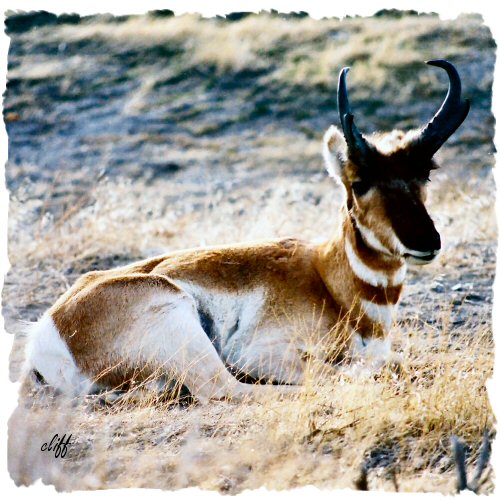
"We will not always have a smooth, ready answer to the question, 'Why me? Why now? Why this?'—for as Moroni observed, "Ye receive no witness until after the trial of your faith.” – Elder Neal A. MaxwellThere lay a pronghorn right in full view, unharmed and uncaring. It relaxed in front of the LDS church chapel at the gate of Dugway Proving Grounds in Skull Valley, Utah.
I had been shot by accident just a few hours earlier but fortunately not wounded. Yet here lay a big game animal with decent tasting meat free from any bullet. Where is the fairness in that? It was free from any adverse consequences of either hunters or crazy target practice shooters farther north up the highway.
Go figure. I mean why me and how come this pronghorn gets off so easy?
Well, at least I shot the beast with my camera.
LDS Lessons Learned in an LSD World:
The process of life and free agency means that some days you're a bug, some days you're a windshield.
Monday, March 13, 2006
6400 Dead Sheep in Dugway in '68
Psalms 49:14 Like sheep they are laid in the grave; death shall feed on them;
Hmmm, just found this bit of information on the history of dead animals outside of Dugway. In all fairness, I saw only a few deceased cattle, which is nothing compared to thousands of dead sheep there in the '68.
LDS lessons learned in an LSD World:
Hmmm, just found this bit of information on the history of dead animals outside of Dugway. In all fairness, I saw only a few deceased cattle, which is nothing compared to thousands of dead sheep there in the '68.
In March 1968, 6,400 sheep were found dead after grazing in south Skull Valley, an area just outside Dugway's boundaries. When examined, the sheep were found to have been poisoned by a deadly nerve agent called VX. The incident, coinciding with the birth of the environmental movement and anti-Vietnam protests, created an uproar in Utah and internationally.One side note. There's no sheep there now.
LDS lessons learned in an LSD World:
- Dead animals are a bad sign but dead people are a worse one.
Samuel Clemens Opines About Skull Valley
 It seems that Mr. Samuel Longhorne Clemens opined about the harshness of Skull Valley. Local broadcast journalist Ken Verdoia continues his interview with historian Dennis Defa over the history of the Goshute Indians in the harsh environment of Skull Valley.
It seems that Mr. Samuel Longhorne Clemens opined about the harshness of Skull Valley. Local broadcast journalist Ken Verdoia continues his interview with historian Dennis Defa over the history of the Goshute Indians in the harsh environment of Skull Valley.Verdoia: By the early 1860s when a young writer by the name of Samuel Clemens transits the [Skull Valley] area, he comments that he has seen the most miserable form of human existence. You reference it in your chapter. His view of the Goshute people from, I would assume, the Overland Stage route, is one of a horrific existence on a horrific landscape. Is that one of the consequences of this conflict between Goshute and increasing white settlement?LDS lesson learned in an LSD World:
Defa: It is. It's a direct result. To go across the desert in a stage, and especially someone like Samuel Clemens who comes from Missouri, where it is so green and it is so lush that for many of these people, as you read their journals, their descriptions would, would make one think that they had arrived on the backside of the moon, they just could not appreciate, nor could they understand, that kind of a landscape. It provided them with no references in terms of what their experiences had been. It was an area to get through as fast as possible.
- Samuel Clemens was smart
Sunday, March 12, 2006
Skull Valley's Goshutes: Most Adapted to Desert Living
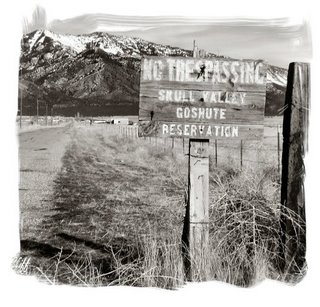 Here's an interesting interview of historian Dennis Defa, who has had a life long fascination with Skull Valley and its Goshute Indians. From what I can see, there aren't many living in the valley today. The Goshutes, a very small community of the Shoshone tribe, had long ago adjusted themselves to living in Death Valley and later Utah's Skull Valley. Mr. Defa observes about these 100 or so Native Americans:
Here's an interesting interview of historian Dennis Defa, who has had a life long fascination with Skull Valley and its Goshute Indians. From what I can see, there aren't many living in the valley today. The Goshutes, a very small community of the Shoshone tribe, had long ago adjusted themselves to living in Death Valley and later Utah's Skull Valley. Mr. Defa observes about these 100 or so Native Americans:"The [Skull Valley] Goshute represent, I think, the best example of what's been called the desert culture in modern terms than any of the other groups in the Great Basin. There were never many of them, but there have always been people out there. And for white Americans or the casual observer, it's a desert. It's a harsh desert. It's not even a pleasant desert like the deserts in Arizona, the Sonora Deserts. But yet the Goshutes have always viewed it as their home. They have an intimate understanding of everything that desert provides.""...Water is the common denominator out there. Without water you don't survive. With water you can survive fairly well. As whites moved into the West Desert, they had to have the same thing. They had to have water. They had to have grass for their livestock. And as they moved into those more favorable areas, Indians were forced out. By depriving them of the water and the resources that went along with the water, the Indians suffered horrifically. They lost food sources. They lost places of shelter. They lost access to pinion pines for pine nuts and they came in direct competition with the white settlers. Horses didn't mean anything to the Goshute, these are not buffalo hunting Indians. Horses were direct competition. They ate the grass that provided the seeds for the Goshute. When the Pony Express and the Overland Stage went through, water is the common denominator. And when you're using animals like horses, you have to have water and you have to have feed. Those were the same places that the Goshute used to gather."
Water in Skull Valley
HORSESHOE SPRING
A reader commented about a spring of water close to the colony of Iosepa. Although the valley only recieves an inch and a half of water a year, there is an underground spring of Horseshoe Spring several miles north of Iosepa. The spring feeds a few small ponds, with water temperature staying 72 degrees during the winter.
The Hawaiians raised carp in those ponds.
It's a strange place. The desert goes straight into the blue and green pond, with no trees or shrubs. So summers must be really harsh here. A local guy told me that the trench that feeds the spring water into the ponds largely dries up during the summer months.
In the past few decades, the spring was made into a national protection area in order to block the transportation of used plutonium for storage in the Indian reservation.
DEAD CATTLE WARNING
There was an occasional bloated cattle carcass about 100 yards off the road. Such death just outside Dugway's biological and nerve gas testing area was rather nerve racking. I realize that a reason the cattle are dead by the side of the road is because they were hit on the road by vehicles during the night. But you can see from the photo I took, there aren't any signs of being hit by a car -- no blood, broken bones, bruises, indentations or other signs of trauma.
This cattle and others I saw looked in good shape, considering they were dead. Whatever killed them, killed them quickly.
Was I trodding around in a land hiding nerve gas or atomic radiation? But radiation poisoning should emaciate cattle. Bovine hair should be falling off in clumps. Having not seen a bald cow, I was comforted with that thought. But after looking at that tumescent carcass, a feeling of unease returned.
LDS lessons learned in an LSD World:
A reader commented about a spring of water close to the colony of Iosepa. Although the valley only recieves an inch and a half of water a year, there is an underground spring of Horseshoe Spring several miles north of Iosepa. The spring feeds a few small ponds, with water temperature staying 72 degrees during the winter.
The Hawaiians raised carp in those ponds.
It's a strange place. The desert goes straight into the blue and green pond, with no trees or shrubs. So summers must be really harsh here. A local guy told me that the trench that feeds the spring water into the ponds largely dries up during the summer months.
In the past few decades, the spring was made into a national protection area in order to block the transportation of used plutonium for storage in the Indian reservation.
There was an occasional bloated cattle carcass about 100 yards off the road. Such death just outside Dugway's biological and nerve gas testing area was rather nerve racking. I realize that a reason the cattle are dead by the side of the road is because they were hit on the road by vehicles during the night. But you can see from the photo I took, there aren't any signs of being hit by a car -- no blood, broken bones, bruises, indentations or other signs of trauma.
This cattle and others I saw looked in good shape, considering they were dead. Whatever killed them, killed them quickly.
Was I trodding around in a land hiding nerve gas or atomic radiation? But radiation poisoning should emaciate cattle. Bovine hair should be falling off in clumps. Having not seen a bald cow, I was comforted with that thought. But after looking at that tumescent carcass, a feeling of unease returned.
LDS lessons learned in an LSD World:
- Despite the hot spring, Skull Valley is still very dry
- Be wary of the federal government, especially when it works in secrecy
- Dead cows in a biological testing ground tell me it's time to drive home immediately
Monday, March 06, 2006
Shot in the Stomach
 I had the wildest thing happen to me today. I was shot but I have no wound.
I had the wildest thing happen to me today. I was shot but I have no wound.After writing so much last week on the colony of Iosepa, I went out this afternoon to get another impression of Skull Valley. This Sunday afternoon there were hunters and people target practicing all over the valley. Lots of gun fire, which certainly made me nervous. I should have left the area then and there but I'm afraid I didn’t.
I went up to the top of Lone Mountain (pictured above from a photo I took on the way up), away from the gun fire and began talking with a driver of another car. He was on the inside of his car and I was on the outside talking in. Faster than I could react, I heard a zip followed by a "kersplat" on my stomach. There wasn't much pain. Even better, I didn't see a hole through my yellow jacket and there was no red blood oozing out. No mushrooming holes or even straight little holes, only a small scratch on the side of my stomach. Frankly, how my skin was scratched with no hole or scratch on my clothes remains a mystery to me.
I glanced for Dick Cheney, thinking he must be in the area, . He wasn't, which was a good thing. It meant I would not have to apologize on national television for the inconvenience of putting the VP through so much anguish over shooting me. My luck was improving with every tick of the clock.
I drove down to the direction that the projectile came from -- a cove at the base of the mountain, where I found a Dad and his young kids innocently target practicing.
"Are you shooting pellets?", I asked.
"Nope", replied the Dad. "I have a .357 and my kids have been shooting with .22s."
That was definitely not the answer I wanted. It meant that I had been hit by an actual bullet -- not a pellet or a BB that I had conveniently convinced myself of on the short drive down the hillside.
Since there was no direct line from the bottom cove to the top of the mountain, the best I can figure is that the bullet must have ricocheted off the cliff of the mountain or a rock before it hit me. That's why the bullet didn't go through me -- that and my lucky angel looking over my shoulder.
LDS lessons learned today in an LSD World?
- Don't play with guns, and never fire them in a direction where there might be people. They might fire back.
- Skull Valley, Utah is a hostile place in more ways than its harsh climate. Its filled with crazy Quick Draw Utah McGraws on Sunday afternoons; oh, and their little Baba Looeys have guns too.
- One can't even get lost in the middle of nowhere without fear of being shot.
- And remember. Guns don't kill people. Bullets do.
Saturday, March 04, 2006
Location of Iosepa, Skull Valley, UT
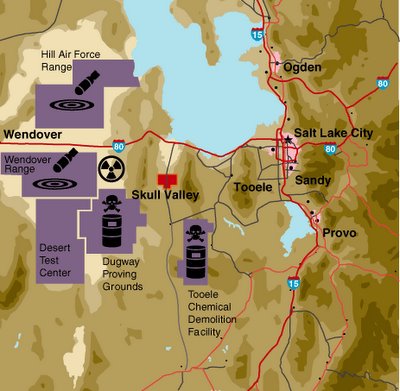
Just found this map of Skull Valley, where the old colony of Iosepa can be found (the red rectangle). The ground has been deemed most appropriate by the federal government to use for bombing ranges, nuclear processing and chemical demolition.
The Hawaiian City of Joseph in Utah
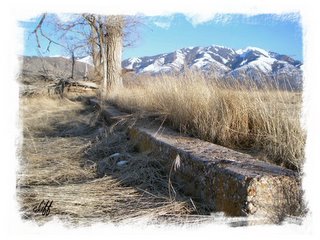 DESOLATION
DESOLATIONLooking at Skull Valley, I see some harsh ground for Utah. It's just southeast of the Bonneville Salt Flats and next to the top secret Dugway Proving Grounds -- a part of Utah that is sparsely populated to say the least. The little water in the area seems to be frozen in the mountains or under ground. Wikipedia describes the valley this way, “Considered an unsuccessful attempt at colonization, Iosepa was an extremely inhospitable location for any group of people.”
But the Hawaiians wanted to be next to the Salt Lake Temple, so I guess Skull Valley, 75 miles out, was reasonably close. I suspect there were other reasons. After all, at the time there was a temple in St. George, a much warmer area but which already had a colony. There was another in Logan and one in Manti, Utah.
I suspect that it wasn’t being close to just any temple but rather the Hawaiian saints wanted to be by Elder Smith, Elder Cannon and other senior authorities at the Church office in SLC.
A BAD NAME TOO
 The colony was named after the Apostle Joseph F. Smith, who served his mission in the Hawaiian islands. They supposedly gave it the Hawaiian name for Joseph -- Iosepa.
The colony was named after the Apostle Joseph F. Smith, who served his mission in the Hawaiian islands. They supposedly gave it the Hawaiian name for Joseph -- Iosepa.Iosepa?? What’s that? The Hawaiian language doesn't have an "s" in its alphabet. "Iokepa" would be the appropriate transliteration of Joseph's name into a Hawaiian pronunciation. "IoSepa" sounds like a bunch of haoles (white guys) slurring the name back to English, sort of a second generation transliteration. e.g. Joseph > Iokepa > Iosepa > And even this distortion is further distorted by being given an Anglo pronunciation, Yo-seh-pa. Matthew Kester of BYU-Hawaii states that Hawaiians were more literate than their Caucasian counterparts at the time. They certainly knew how to read and write their language. Their church leaders also preached in Hawaiian. In other words, the Hawaiians of "Iosepa" knew how to write their language in 1889 just like we know that Lisa is not spelled "3-I-S-A." It's a real indication that the feedback mechanisms to civic leadership were not fully working.
The fact that the Hawaiian saints let the spelling stand meant that they understood the ignorance of the surrounding culture and their civic leaders but went along out of respect for authority. I can't come up with another conclusion than that. For the record, Iokepah is pronounced EE-OO-KE-PAH. The wrong name and pronounciation is but another tangible evidence of Utah haoles trying to make sense and to nurture what they didn't understand. The results of everyone’s efforts are the graves on the ghost town of Iosepa in the desolate Skull Valley.
HAWAIIANS FAILED BECAUSE NOT INDUSTRIOUS?
There are some here that think their brown brothers failed because they simply could not work as hard as the other colonists throughout Utah. One web site author writes,
“The Kanakas were not used to the hard labor necessary to create a colony which was to survive on its own. Although they managed to get by most of time, much of their food was imported from Salt Lake City.”Historian Arrington seems to anticipate this stereotype and responds:
